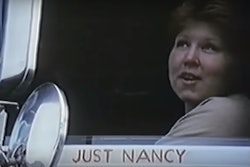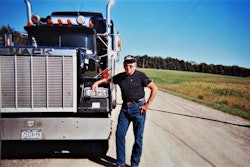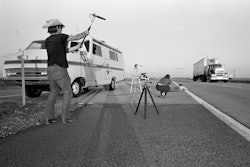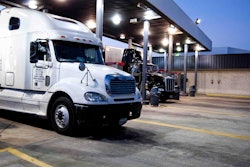Sideburns? Check.
Cabovers? Check.
Hardcore CB chatter? Check.
Yes, we’re talking 1970s trucking. Specifically 1979, the tail end of that decade’s trucking craze, popularized by CB lingo, trucker hats and trucker movies.
It was also an era of trucker shutdowns, which brought the industry to the attention of Optic Nerve, a little-known film collective in San Francisco. Optic Nerve in 1979 produced “On the boulevard,” a half-hour trucking documentary. It’s enjoyable partly because it’s so unlike that era’s slick Hollywood productions, such as “Convoy,” “Smokey and the Bandit,” “White Line Fever” and “Duel”.
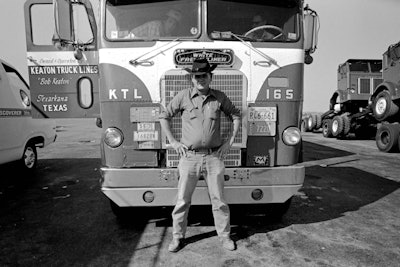 Jobie Vaden is among drivers featured in “On the boulevard.” © Lynn Adler
Jobie Vaden is among drivers featured in “On the boulevard.” © Lynn Adler“Boulevard” shows owner-operators talking about their struggles to survive, being apart from their families, taking pride in running without authority and dodging scales. As the narrator says: “They chase a dream of independence, trying to get away from it all, out there, on the boulevard.”
“Boulevard” had limited airing on some PBS stations. But now you can view it where it’s been hiding many years, on the website of the University of California, Berkeley, Art Museum and Pacific Film Archive, also embedded below. The content begins about 70 seconds after starting the video. (The player responds better to clicking the play head forward rather than dragging it.)
The website describes Optic Nerve’s style as “free-style narrative, little or no voice-over, and a strong commitment to personal contact.” That’s certainly true with this documentary.

 Lynn Adler continues to work in video and photography. © Lynn Adler
Lynn Adler continues to work in video and photography. © Lynn Adler“We just told them we wanted to know about their lives, the economics of being on their own, the sort of fantasy that this was independence” in spite of the constant pressure of making ends meet, says one of the producers, Lynn Adler. “Everybody did what they had to do to keep their truck.”
One of the five members of Optic Nerve who crossed the country to produce “Boulevard,” Adler recalls in Monday’s blog entry how they got interested in owner-operators in the 1970s.
As with so many retrospective looks at trucking, “Boulevard” shows how some things have changed. A new truck is said to cost $80,000; $1,000 would cover fuel for a cross-country trip.
Others are surprisingly familiar, such as this comment from Valdese, N.C., coast-to-coast hauler Bobby Zimmerman about his truck: “My wife – she accuses me of being married to this thing instead of her.” Another driver observes of aspiring owner-operators: “They only last a few months and then they go under.”
Also familiar are the burdens of being an owner-operator, as listed by the narrator: The “long, hard hours.” Trying to stay rolling so you can make payments on a truck. Being subject to the whims of fleets and shippers, as well as “a maze of regulations that seems designed to force them off the road.”
The maze remark could elicit an “if they only knew” response in light of today’s Compliance, Safety, Accountability program, ever-shifting hours rules, ELDs and the rest. But then again, 1970s owner-operators did have the countless absurd restrictions put on rates and lanes by the now-defunct Interstate Commerce Commission, which kept many out of the regulated commodities business or forced them into finding ways around the regs.
A couple, Paul (The Mooncricket) and Charlotte (The Little Missy), illustrate the latter breed. Paul says he can’t legally haul a load (“It’s hot”) since there is no authorized carrier between the manufacturer and the consignee. He says he’ll probably put a bogus sign on his truck. “Just Moonlight Inc., because that’s when I’m going to be running – when the moon’s out.”
A closeup shows him tracing on a map his scale-avoiding route. The next morning, eating in a West Memphis, Ark., truck stop, he says, “Got around them scales, didn’t get caught, feels good.”
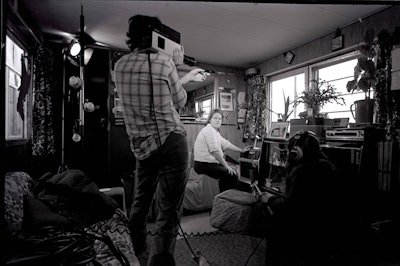 Katherine Clendaniel is interviewed in her home and on the road. © Lynn Adler
Katherine Clendaniel is interviewed in her home and on the road. © Lynn AdlerKatherine Clendaniel (The Teardrop) talks about how she stands out in the male-dominated industry. She demonstrates a mastery of formal and informal CB protocol.
Zimmerman is shown with his family at their N.C. home. Two young sons help him polish his rig. One of them, well taught by Dad, whacks tires with a club to check pressure.
The final minute shows drivers and waitresses at a truck stop, most of them silent. There’s little sound but the clinking of dishes and the song, “I’m so lonesome, I could cry.”
The last few lines of this Hank Williams Sr. classic (“And as I wonder where you are…”) take on another meaning as you watch these video snapshots from 36 years ago, realizing that some of those pictured in “Boulevard” have passed on.
If you’re in the film or recognize any drivers or any fleets in it, comment below. We’d love to hear your memories.
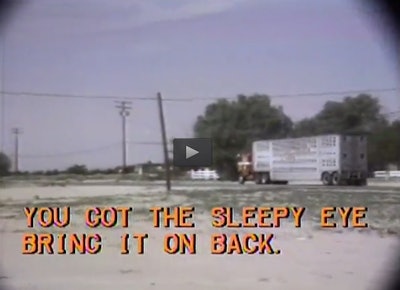 Parts of the documentary include CB conversations with subtext. The Sleepy Eye was Robbie Johnson. © Lynn Adler
Parts of the documentary include CB conversations with subtext. The Sleepy Eye was Robbie Johnson. © Lynn Adler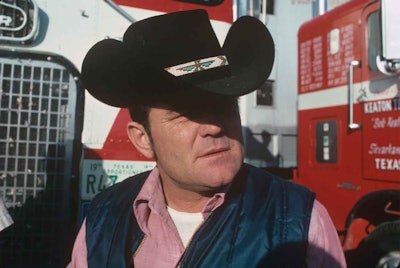 Bob Peek, who appears in “On the boulevard,” had the handle of The Trailblazer. © Lynn Adler
Bob Peek, who appears in “On the boulevard,” had the handle of The Trailblazer. © Lynn Adler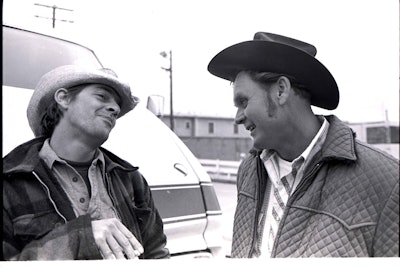 Jules Backus of Optic Nerve, left, talks with driver Jobie Vaden. © Lynn Adler
Jules Backus of Optic Nerve, left, talks with driver Jobie Vaden. © Lynn Adler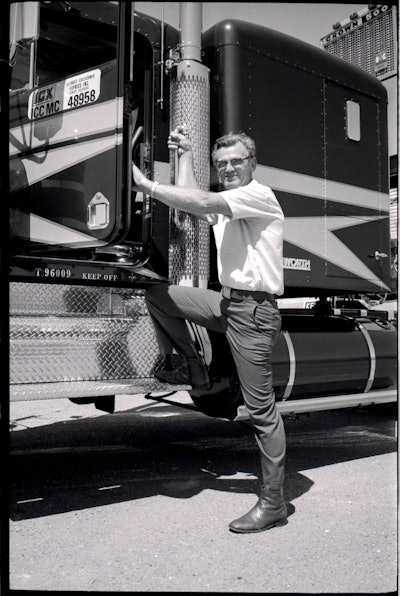 A 2004 issue of 10-4 Magazine says Gene Schriendl owned a Kenworth that was used in the movies “Smokey and the Bandit II” and “Thunder Run.” © Lynn Adler
A 2004 issue of 10-4 Magazine says Gene Schriendl owned a Kenworth that was used in the movies “Smokey and the Bandit II” and “Thunder Run.” © Lynn Adler
